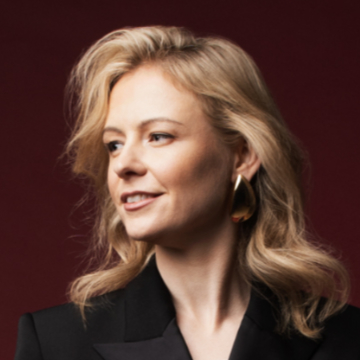William Ford | 9 JUN 2025
Widely regarded as one of the most compelling conductors of her generation, Gemma New is known for her keen musical insight, dynamic leadership, and ability to forge deep connections with both musicians and audiences. A New Zealand native with an impressive international resume, she’s also a proud new resident of Atlanta—a city she now calls home. In September, she’ll step onto the podium at Atlanta Symphony Hall to lead the Atlanta Symphony Orchestra in a program featuring superstar pianist Lang Lang in Beethoven’s Piano Concerto No. 5 (“Emperor”). (Full concert details here)
In this wide-ranging conversation with EarRelevant contributor William Ford, New reflects on her journey from youth orchestras in New Zealand to conducting major orchestras and opera companies around the world. Along the way, she shares insights on rehearsal strategy, the unique personalities of orchestras, and what it really feels like to stand in front of a full ensemble as the music comes alive.
The transcript of the interview that follows has been lightly edited for clarity, readability, and length. The full video interview is embedded below the the text version.
William Ford: Where are you right now?
Gemma New: I’m in Atlanta. I have a few days off, so it’s nice to be home. I just moved here about a year ago. I love the weather, the city, and the people. And I love the airport — it’s so convenient for my travel schedule.
Ford: What area of town do you live in?
New: Midtown, not far from Symphony Hall. I have a nice view of the Kennesaw Mountains.
Ford: Tell us about your musical background.
New: I grew up in a musical family in New Zealand. My mom played violin and still plays in community orchestras. I started violin at five and piano at seven. Playing in school orchestras and youth orchestras really fostered my love for music. When I was twelve, performing “Pictures at an Exhibition” with 200 young people was a defining moment — I knew I wanted to be involved with music for life.

Gemma New (credit: Benjamin Ealovega)
Ford: How did you decide to become a conductor?
New: At fifteen, I had my first opportunity to conduct. It felt natural. I loved working with my peers, analyzing the score, and leading the ensemble. Conducting combined my love for music and leadership.
Ford: What happened between that and studying at Peabody?
New: I focused on mastering my instruments and joined as many orchestras as possible. A pivotal moment came when Jacques Lacombe visited the National Youth Orchestra of New Zealand; he let me conduct during soundchecks and wrote my recommendation for Peabody, where I studied conducting intensively.
Ford: Who were your important mentors?
New: Gustav Meier and Markand Thakar at Peabody taught contrasting approaches, giving me a versatile toolkit. Later, assisting Leonard Slatkin, David Robertson, and others also shaped my development.
Ford: Has the sound of orchestras become more homogenized?
New: No, orchestras still maintain unique sounds based on tradition, ethos, and geography. Playing the same piece in Italy, France, or Canada reveals vastly different characters.
Ford: How important is hall acoustics in your planning?
New: It’s crucial. When planning programs or deciding on string counts, the hall’s acoustics, traditions, and the orchestra’s typical setup all play roles.
Ford: Conducting Mahler with per-service orchestras versus full-time ones — any difference?
New: Mahler is always a special event, especially for per-service orchestras who anticipate it all year. The passion they bring is extraordinary.
Ford: Have you had difficult experiences with orchestras?
New: Every orchestra is unique, like meeting a new person. Creating a positive, efficient, and open rehearsal atmosphere helps overcome challenges.
Ford: Are you still with the Hamilton Philharmonic?
New: No, I had a wonderful nine years and stepped down to focus more on guesting in Europe and opera.
Ford: How do you manage your New Zealand Symphony work?
New: I go back about three times a year, depending on scheduling. They plan two years ahead to make everything fit.

Gemma New (credit: Benjamin Ealovega)
Ford: Where have you conducted opera?
New: Opera Theatre of Saint Louis, Santa Fe Opera, and productions in California and Houston, among others. I aim for about one opera production a year.
Ford: How do you approach famous works like Beethoven’s Fifth?
New: I treat every piece as fresh. Making assumptions can be dangerous. Preparation and listening are key, even with works the orchestra knows well.
Ford: What goes through your mind while conducting?
New: In rehearsal, I’m focused on diagnosing and fixing things. In concerts, I’m in the moment, feeling the pacing, strength, and character of the music.
Ford: Do you adjust your conducting gestures in real time?
New: Absolutely. It’s always a dynamic conversation. Gestures change based on what happened in rehearsal or even earlier in the performance.
Ford: Is working with top orchestras different?
New: Ideally, you start the week quietly and gradually become more specific. Trust builds over the rehearsals.
Ford: Who are conductors you admire?
New: Gustavo Dudamel for his expressiveness, Esa-Pekka Salonen for his clarity, and mentors like Leonard Slatkin and David Robertson.
Ford: Do you listen to music for pleasure?
New: Yes, but carefully. Classical music affects my mood deeply. For relaxation, I often listen to artists like Taylor Swift.
Ford: Any final thoughts about programming?
New: It’s important to trust artistic administrators to choose repertoire that fits the orchestra, audience, and timing. That leads to the most special events. ■
EXTERNAL LINKS:
- Gemma New: gemmanew.com

Read more by William Ford.







.png)